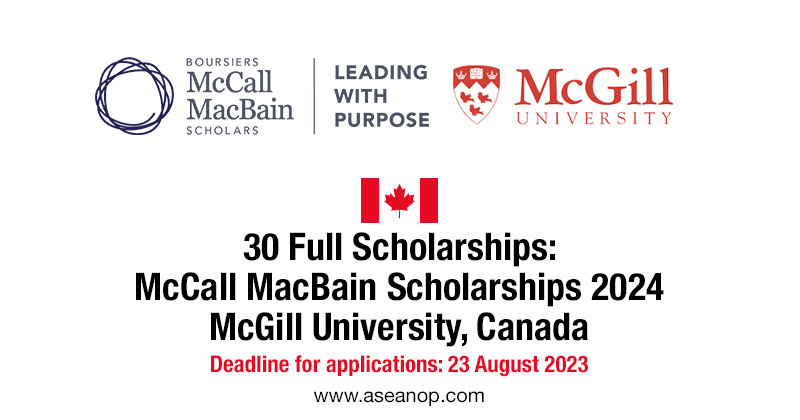30 Full Scholarships: McCall MacBain Scholarships 2024, McGill University, Canada

Deadline for applications: 24 August 2023 (International)
Applications will open on June 1st, 2023 for the 2024 cohort.
Eligibility Criteria
To be eligible to apply for our 2024 cohort, you must meet ONE of the following criteria:
- You are a current student on track to earn your first bachelor’s degree by August 2024
- You earned your first bachelor’s degree in the last five years (January 2018 or later)
- You earned your first bachelor’s degree more than five years ago, and are 30 years or younger in 2023
You will also need to meet the minimum degree and language requirements for McGill master’s program admission.
Application Deadlines for 2024 Admission
Canada and United States
Students and graduates of universities in Canada and the United States, as well as Canadians abroad, should apply by: September 27, 2023
International
Students and graduates of universities located in other countries should apply by: August 24, 2023
About the Application
Personal information
At the start of the application, we ask for personal information about you and your family members.
We’re asking because we want to understand more about you. We recognize that everyone’s journey to graduate school is different, and this information will help us understand some of the influences that helped shape who you are today.
Activities, Work Experience, and Breaks
You’ll be asked to share your community activities, extra-curricular activities, work history, and any breaks you’ve taken. We want to understand more about how you spend your time outside of the classroom.
Remember, there is no one right set of activities. We want to know about your responsibilities, accomplishments, and motivations. Similar to other parts of the application, we’ll be looking for evidence of the selection criteria in some of the experiences you share with us.
Short Essays
You’ll submit several short essays of 250-300 words each.
Think of these essays as opportunities to reflect on who you are. Tell us about your goals, influences, meaningful experiences, and a significant “course correction”. You can expand on activities you listed elsewhere in your application or provide new examples.
Make sure to tell us what happened. We want to know what your role was, what you actually did, who else was involved, and more.
Transcripts
You’ll be asked to upload all transcripts (PDF files) from your university studies. We accept both official and unofficial transcripts.
Keep in mind that we are not solely focusing on your GPA. While GPA is important, we are interested in the fit with your proposed graduate program, as well as the breadth and difficulty of the courses taken alongside your other commitments. Of course, we recognize that some programs offer more opportunity for breadth than others.
You can always provide context for your university transcripts, if needed.
Resume
You’ll upload a one-page resumé. Your resumé must be a PDF file with a minimum font size of 10. Please do not include photos.
Your resumé provides a one-page summary of what you’ve shared in other sections of the application, such as your academic, professional, and community experiences. You can use this single page to highlight what is most important to you in your experiences, and to share other information that may not have been included in the rest of your application.
If you are returning to school after being in the workforce, this section allows you to provide a more in-depth version of your work history.
References
You must have two reference forms completed before the application deadline: an academic* reference from someone who knows your academic work well and a community reference from someone who knows your community involvement well.
*If the program you’re applying to doesn’t require an academic reference, you can provide a professional (work) reference instead of an academic one. If your program requires at least one academic reference, then this reference must also be an academic one.
When you submit a reference request, the reference writer will receive an email with a private link to fill out an online form. See the questions we’ll ask them.
Please ask people who know you well. A good reference provides concrete examples to help us better understand you, how you meet the selection criteria, current areas of improvement, and how your proposed studies might benefit your continued growth.
Do not choose family members, fellow students, or friends.
Source / More information: Official Website HERE.

I would like to ask about some information in archive scholarship program
Can apply for scholarship in this website from Myanmar?